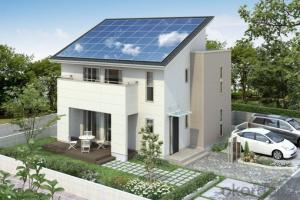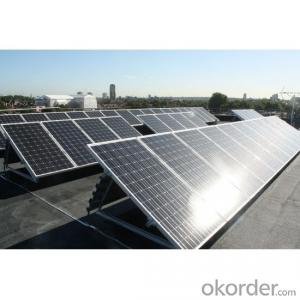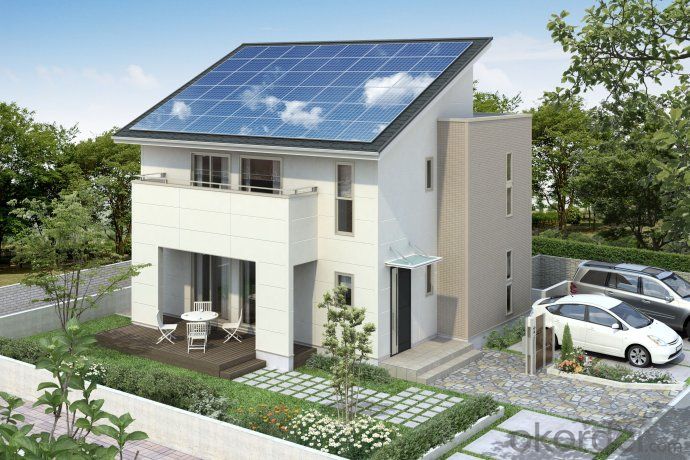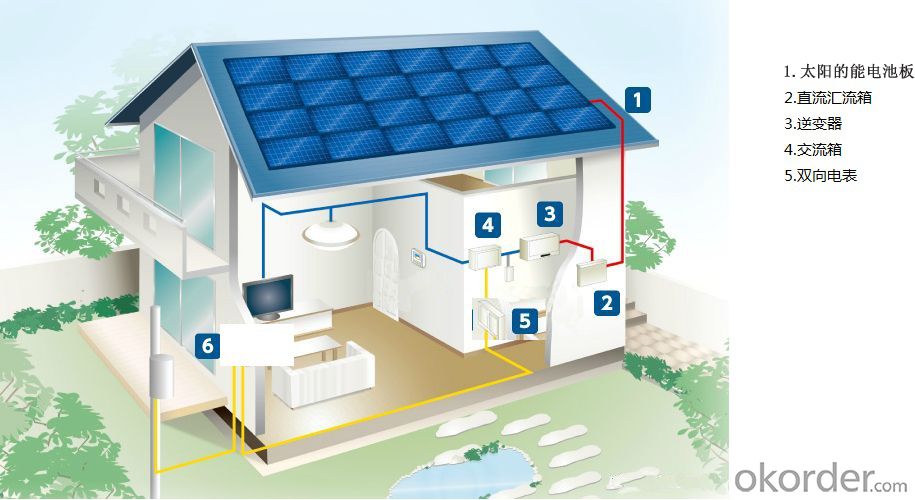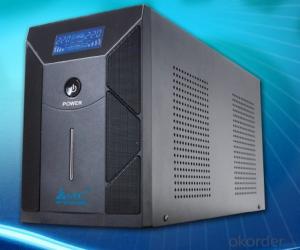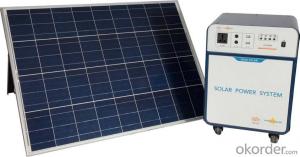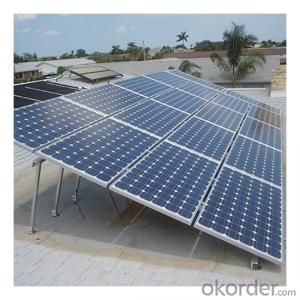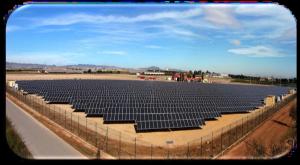Roof and Ground Solar System Falsh Sale New
- Loading Port:
- Shanghai
- Payment Terms:
- TT or LC
- Min Order Qty:
- 2000 watt
- Supply Capability:
- 2000000 watt/month
OKorder Service Pledge
OKorder Financial Service
You Might Also Like
| Quick Details | |||||
| Specification: | Normal | Application: | Home | Output Voltage (V): | AC110V/220V |
| Load Power (W): | 3KW | Solar Power (W): | 3KW | Work Time (h): | 48 |
| Cables: | 50m | Solar Panel Rack: | Optional | Battery Capacity: | 12V/200AH*8pcs |
| Controller Voltage: | 48V | Inverter Output Voltage: | AC220V/110V | Efficiency: | 90% |
| Inverter: | DC48V | Rated Output Capacity: | 3000W | Solar Panel Power: | 250w*12pcs |
| Solar Panel Type: | Crystalline Silicon PV Module | ||||
| Packaging & Delivery | |
| Packaging Detail: | using carton or wooden box as per customer's requirement. |
| Delivery Detail: | within 10~30 days for shipment depending on order quantity |
Excellent battery backup 300W to 10KW off grid solar system with grid power switch
Anern Advantage:
1) Over 10 year experience in clean energy line, business covering solar street light, solar garden light, off grid
solar system and on grid solar power system, etc;
2) Exporting for worldwide, with satisfied clients more than 50 countries;
3) Competitive price, excellent service, integrated certificate system;
We supply CE, RoHS certificates if you need
Welcome to visit our factory at any time.
Solar system advantages:
1. CE, ROHS approved.
2. High conversion efficiency, high-transmission rate.
3. Energy saving, environmental-friendly.
4. Advanced technology, strict quality control system.
5. Easy installation, safe operation, free maintenance.
6. Low MOQ, fast delivery time, long service life
| Specifications: | ||
| Ref No. | OFF-SGHP-3KW | |
| System Basic Information | Solar Panel Rated Output Power | 3KW |
| Suitable for Max Daily Power Consumption | 10KWH | |
| Rated Output AC Capacity | 3KW | |
| Solar panel | ||
| Type | Crystalline Silicon PV Module, A-class | 12pcs |
| Max Power | 250W | |
| Vmp | 30.5V | |
| Size | 1655*992*45mm | |
| Weight | 22.5kg/pc | |
| 25 years power output guarantee (Note: 2pcs panels connect in series) | ||
| Controller | ||
| Voltage | 48V | 1pc |
| Current | 60A | |
| Warranty | 1 year | |
| PWM high-efficiency charging controller, LED display, intelligent control; Temperature compensation, various protections. | ||
| Circuit Breaker | Used for protection of controller, installed between PV array combiner and controller | 1pc |
| Inverter | ||
| Input Voltage | DC48V | 1set |
| Output Voltage | AC220V/110V 1-phase | |
| Frequency | 50/60Hz | |
| Efficiency | 90% | |
| Note: This inverter provides grid power switch and battery charging functions. | ||
| Battery | ||
| Capacities | 12V/200AH per piece | 8pcs |
| Service life | 5 to 6 years | |
| Warranty | 3 years | |
| Solar panel rack | Flat-roof type mounting rack, steel material, anti-rust treatment | 1 set |
| (Other types of racks can be customized as per client's requirement) | ||
| Cable | 50m | |
| Connectors | 3-terminal connectors, used for panels connection in parallel | 6 set |
Product features:
1. Off grid solar power system is mainly used for application with relatively-small power consumption, and the areas have no grid network coverage, or grid power is unstable or outage condition.
2. It’s composed of solar panels, hybrid solar inverter, battery bank, solar panel mounting racks, and other accessories required fora complete home solar power system.
3. The battery bank gives a stable power output to the solar inverter which converts DC to AC to power loads, and provides power backup in rainy or cloudy days.
4. The solar panels generate electricity at daytime and charge the battery bank .
5. The off grid home solar power system provides grid power bypass in case of battery power shortage when sunshine is not enough.
6. All the off grid home solar power system configurations are worked out by scientific calculation and design.
FAQ
We have organized several common questions for our clients,may help you sincerely:
1.How about your company?
We are a private-owned high-tech company who specializes in developing, manufacturing and marketing of silicon ingots, solar wafer, solar cells, solar modules, PV systems and solar applications products.
At present, We has one research & development team, whose members are well-known experts in photovoltaic area. We also have advanced production and test equipment.
2.How to guarantee the quality of the products?
Our products have been certified by CE, CEC,MCS, IEC61215, IEC61
730 and ISO9001.
• 25 year transferrable power output warranty: 10 years / 90%, 25 years / 80%*
• 12 year material and workmanship warranty
• Timeliness of delivery
• Quality Products certified (TUV, IEC, CE.ISO9001.MCS)
3.How long can we receive the product after purchase?
In the purchase of product within three working days, We will arrange the factory delivery as soon as possible. The pecific time of receiving is
- Q: Can solar energy systems be used for powering wastewater treatment plants?
- Absolutely, wastewater treatment plants can definitely utilize solar energy systems for power. To generate electricity, solar panels and other solar energy systems can be installed on the rooftops or in open areas surrounding the treatment plants. This generated electricity can then be utilized to power the various components and processes involved in wastewater treatment, including pumps, motors, blowers, and filtration systems. Using solar energy for wastewater treatment plants brings several advantages. Firstly, it is an environmentally friendly and sustainable energy source, helping to reduce the carbon footprint and environmental impact of these facilities. Solar energy systems produce electricity without releasing any greenhouse gases or pollutants into the air, making them an excellent choice for preserving the environment. Secondly, solar energy systems can provide a consistent and dependable power supply to the treatment plants. The availability of sunlight is generally predictable, and advancements in solar technology have enabled the storage of excess energy in batteries for use during cloudy days or at night. This ensures uninterrupted operation of the wastewater treatment plants, even in areas with unreliable grid connections or frequent power outages. Moreover, solar energy systems can also contribute to cost reduction for wastewater treatment plants. By generating their own electricity, these facilities can potentially decrease their reliance on the grid, resulting in substantial savings on energy bills. Additionally, solar energy systems require minimal maintenance and have a long lifespan, leading to further cost savings over time. In conclusion, solar energy systems can be effectively utilized for powering wastewater treatment plants. They provide a clean, dependable, and cost-effective solution that not only reduces the environmental impact but also offers energy independence to these crucial facilities.
- Q: Do solar energy systems require planning permission?
- Yes, solar energy systems typically require planning permission in most regions. The exact regulations and requirements may vary depending on the location and the specific characteristics of the system. It is advisable to consult with local authorities or a professional installer to ensure compliance with the relevant planning regulations and obtain proper permission before installing a solar energy system.
- Q: Are there any tax credits available for installing a solar energy system?
- Yes, there are tax credits available for installing a solar energy system. The federal government offers a Solar Investment Tax Credit (ITC) that allows homeowners and businesses to deduct a percentage of the system's cost from their taxes. Additionally, some states and local governments may also offer their own tax incentives for solar installations.
- Q: Can solar energy systems be installed on sloped roofs?
- Yes, solar energy systems can be installed on sloped roofs. In fact, sloped roofs are quite common for solar panel installations. The angle of the sloped roof can be adjusted to optimize the sunlight exposure and increase energy production.
- Q: Can a solar energy system be installed in an area prone to hurricanes?
- Yes, a solar energy system can be installed in an area prone to hurricanes. However, it is important to take certain precautions and considerations into account to ensure the system's durability and safety during extreme weather events. Firstly, it is recommended to use hurricane-resistant solar panels that are specifically designed to withstand strong winds and flying debris. These panels are typically made with reinforced glass and have a higher wind load rating. Additionally, the mounting system used should also be designed to be hurricane-resistant, with strong foundations and secure fastenings. Moreover, the installation process should involve a thorough inspection of the area to identify any potential risks or hazards. Factors such as the elevation of the installation site, proximity to bodies of water, and local building codes should be considered to ensure the system is installed in a safe and secure manner. In areas prone to hurricanes, it is also essential to have a backup power system in place. This can be in the form of battery storage or a backup generator, which can provide electricity during power outages caused by severe weather. Regular maintenance and inspections are crucial for the longevity and safety of a solar energy system in hurricane-prone areas. This includes checking the integrity of the panels, wiring, and mounting structure, as well as trimming trees and foliage that could potentially damage the system during high winds. Overall, while it is possible to install a solar energy system in an area prone to hurricanes, it is essential to follow specific guidelines and precautions to ensure the system can withstand severe weather conditions and continue to operate safely and efficiently.
- Q: How does the cost of solar panels vary based on the manufacturer?
- The cost of solar panels can vary significantly based on the manufacturer. There are several factors that contribute to the price differences among manufacturers. Firstly, the quality and efficiency of the solar panels can vary between manufacturers. Some manufacturers invest heavily in research and development to improve the efficiency of their panels, resulting in higher-priced but more efficient products. These panels can generate more electricity per square meter, ultimately providing better value for money in the long run. Secondly, the reputation and brand recognition of a manufacturer can impact the cost of their solar panels. Well-established manufacturers with a strong track record of producing reliable and durable panels tend to have higher prices. This is because their products are often perceived as more trustworthy and are backed by extensive warranties and customer support. Thirdly, the manufacturing scale and volume can influence the cost. Larger manufacturers often benefit from economies of scale, allowing them to produce solar panels at a lower cost per unit. They can negotiate better terms with suppliers, have access to advanced production technologies, and optimize their operations more efficiently. These cost savings can be passed on to consumers, resulting in more competitive prices. Lastly, the country of origin can affect the cost of solar panels. Manufacturing costs can vary significantly depending on the labor and production costs of different regions. Panels manufactured in countries with lower labor costs may have a lower price tag compared to those made in countries with higher labor costs. It is important to note that while cost is a crucial factor, it should not be the sole consideration when choosing solar panels. Other aspects such as warranty, durability, efficiency, and after-sales support should also be taken into account.
- Q: How do solar energy systems impact the stability of the electricity grid?
- Solar energy systems can have both positive and negative impacts on the stability of the electricity grid. On one hand, solar panels generate clean and renewable energy, reducing the reliance on fossil fuels and lowering greenhouse gas emissions. This diversification of the energy mix can enhance the stability and resilience of the grid. However, the intermittent nature of solar power, influenced by weather conditions and daylight availability, can create challenges for grid operators in maintaining a constant supply-demand balance. Proper integration of solar energy systems with advanced grid management technologies and energy storage solutions is crucial to mitigate these potential destabilizing effects.
- Q: Are there any safety concerns with solar energy systems?
- Yes, there are some safety concerns associated with solar energy systems. These concerns include potential electrical hazards during installation or maintenance, fire risks due to faulty wiring or improper installation, and the release of hazardous materials during the manufacturing or disposal of solar panels. However, it is important to note that these risks can be minimized through proper installation, regular maintenance, and adherence to safety standards and regulations.
- Q: Can solar energy systems be used for lighting outdoor spaces?
- Certainly, outdoor spaces can be illuminated using solar energy systems. Typically, solar lighting systems comprise solar panels, batteries, and LED lights. Sunlight is collected by the solar panels and converted into electricity, which is then stored in the batteries. The LED lights are powered by the stored electricity and provide illumination for outdoor areas like gardens, pathways, patios, or parks. There are various advantages to using solar-powered outdoor lighting systems. Firstly, they are eco-friendly since they do not emit any greenhouse gases during operation. Moreover, they do not rely on an external power source, making them independent of the electrical grid. This makes them particularly suitable for remote or off-grid locations where connecting to the grid may be challenging or expensive. Solar outdoor lighting systems are also cost-effective in the long term. Although the initial installation cost may be higher compared to traditional lighting systems, there are no monthly electricity bills associated with solar lighting. Furthermore, these systems have minimal maintenance requirements as the solar panels and batteries are designed to endure different weather conditions. Another benefit of solar lighting systems is their versatility and ease of installation. Since they do not require underground wiring or electrical connections, they can be effortlessly installed in any outdoor space. This makes them ideal for temporary or seasonal lighting needs as they can be easily relocated or repositioned. In conclusion, solar energy systems can definitely be utilized for illuminating outdoor spaces. They offer a multitude of benefits including environmental sustainability, cost-effectiveness, low maintenance, and easy installation. Solar lighting systems provide a practical and dependable solution for illuminating outdoor areas while minimizing energy consumption and reducing carbon footprint.
- Q: Can solar energy systems be used in apartment buildings or multi-unit dwellings?
- Yes, solar energy systems can be used in apartment buildings or multi-unit dwellings. These systems can be installed on the roof or in common areas to generate clean and renewable energy for the entire building or shared spaces. This allows residents in apartment buildings to benefit from reduced energy costs and a more sustainable living environment.
Send your message to us
Roof and Ground Solar System Falsh Sale New
- Loading Port:
- Shanghai
- Payment Terms:
- TT or LC
- Min Order Qty:
- 2000 watt
- Supply Capability:
- 2000000 watt/month
OKorder Service Pledge
OKorder Financial Service
Similar products
Hot products
Hot Searches
Related keywords
